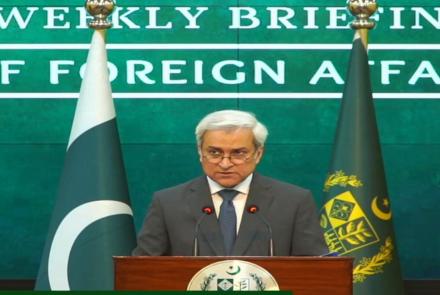- Advertisement -
ISLAMABAD, Oct 24 (APP):Foreign Office Spokesperson, Ambassador Tahir Hussain Andrabi, in his maiden press briefing, on Friday outlined Pakistan’s major diplomatic initiatives, regional security developments, and foreign policy positions on key global issues, reaffirming the country’s commitment to peace, dialogue, and international cooperation.
Welcoming journalists to the briefing, Ambassador Andrabi said he was “humbled by the responsibility” and looked forward to constructive engagement with the media in communicating Pakistan’s foreign policy priorities.
Ambassador Andrabi began by highlighting the official visit of Poland’s Deputy Prime Minister and Foreign Minister Radoslaw Sikorski to Pakistan from October 23–24 at the invitation of Deputy Prime Minister and Foreign Minister Senator Mohammad Ishaq Dar. The visit included delegation-level talks, the signing of Memorandums of Understanding, and a joint press interaction.
The Polish Foreign Minister also called on Prime Minister Shehbaz Sharif, who emphasized Pakistan’s readiness to expand cooperation in trade, energy, defense, education, and labor. The Prime Minister reiterated Pakistan’s principled position on resolving regional disputes, including Jammu and Kashmir, through dialogue and diplomacy in line with UN Security Council resolutions.
During the visit, the Polish side noted that Polish investment in Pakistan’s petrochemical sector exceeded US$1.5 billion and expressed willingness to enhance collaboration in water treatment and industrial technology. Both sides agreed to deepen their partnership across multiple sectors and maintain regular high-level contacts.
Ambassador Andrabi informed the media that Deputy Prime Minister and Foreign Minister Ishaq Dar held three important telephone conversations during the week with UAE Foreign Minister Sheikh Abdullah bin Zayed Al Nahyan, Saudi Foreign Minister Prince Faisal bin Farhan, and Moroccan Foreign Minister Nasser Bourita. The discussions focused on strengthening bilateral relations, promoting peace in the Middle East, and enhancing cooperation in trade, investment, and education. The Moroccan Foreign Minister accepted an invitation to visit Pakistan.
On regional peace and security, Ambassador Andrabi said Pakistan welcomed the agreement reached with Afghanistan in Doha on October 19, describing it as an important first step toward ensuring peace and stability along the Pakistan–Afghanistan border.
The agreement, facilitated by Qatar and Türkiye, was achieved following delegation-level talks led by Defence Minister Khawaja Asif. The discussions focused on ending cross-border terrorism and restoring border stability.
The Spokesperson added that Pakistan looked forward to the next round of talks in Istanbul on October 25, aimed at establishing a verifiable monitoring mechanism. He reiterated that Pakistan “does not seek escalation” but expects the Afghan authorities to take concrete action against terrorist groups such as TTP, ISKP, and BLA.
Turning to developments in the Middle East, Ambassador Andrabi strongly condemned Israel’s attempt to extend its so-called sovereignty over parts of the occupied West Bank, describing it as a flagrant violation of international law and UN Security Council Resolution 2334. He reaffirmed Pakistan’s unwavering support for the Palestinian cause, including the establishment of an independent, sovereign, and contiguous state of Palestine with Al-Quds Al-Sharif as its capital.
He welcomed the recent International Court of Justice (ICJ) advisory opinion, which held Israel legally obligated to facilitate humanitarian assistance in occupied Palestinian territories. The ruling, he noted, reaffirmed that Israel has no right to extend its domestic laws over occupied territories in any form. Pakistan, alongside the OIC, the State of Palestine, and other Muslim countries, issued a joint statement condemning Israeli settlement expansion and reaffirming the illegality of the occupation.
Ambassador Andrabi also highlighted a major national achievement: the successful launch of Pakistan’s first hyperspectral satellite (HS-1) by the Space and Upper Atmosphere Research Commission (SUPARCO) from a Chinese launch center. The satellite, he said, would revolutionize precision agriculture, environmental monitoring, and disaster management, while showcasing Pakistan–China collaboration in peaceful space exploration.
He noted that Pakistan had recently organized the 5th Pakistan–Africa Trade Development Conference and Single Country Exhibition in Addis Ababa, Ethiopia, featuring over 110 Pakistani exporters from 11 sectors under the government’s Engage Africa Policy. The event, inaugurated by Commerce Minister Jam Kamal Khan Shah and Ethiopia’s Transport Minister Ilumu Faisa, sought to boost trade and investment ties with Africa, a region rapidly emerging as a global economic hub.
Ambassador Andrabi said Pakistan also took part in the 19th Midterm Ministerial Meeting of the Non-Aligned Movement (NAM) in Kampala, Uganda, where the Pakistani delegation reaffirmed the country’s support for peace, development, and the right to self-determination for people under foreign occupation. Pakistan condemned rising Islamophobia and reiterated its commitment to the principles of the UN Charter.
Concluding the briefing, the Spokesperson extended Pakistan’s warm congratulations to Prime Minister Sana Takai and Foreign Minister Motegi Toshimitsu of Japan on their appointments, expressing the country’s desire to further strengthen its longstanding friendship and cooperation with Japan.
Ambassador Andrabi thanked members of the media for their presence and said he looked forward to continued engagement, emphasizing that the Ministry of Foreign Affairs would maintain transparency, proactive communication, and openness in its dialogue with the press.

